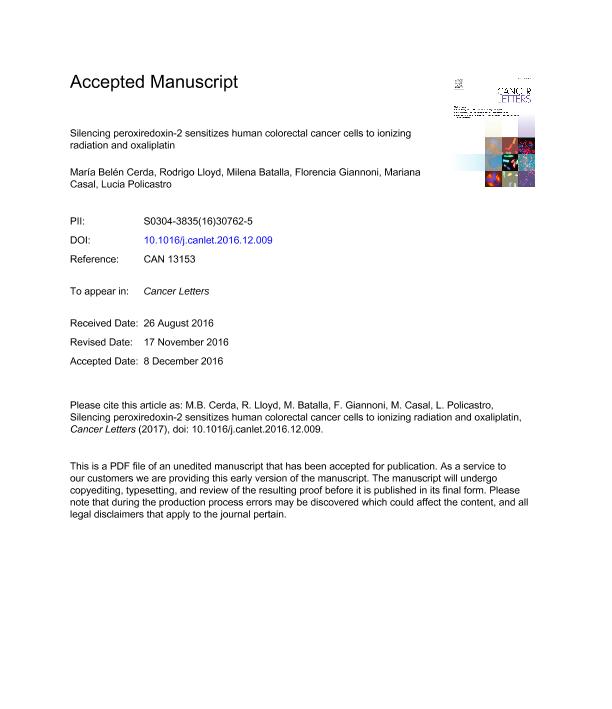Artículo
Silencing peroxiredoxin-2 sensitizes human colorectal cancer cells to ionizing radiation and oxaliplatin
Cerda, Maria Belen ; Lloyd, Rodrigo; Batalla, Milena; Giannoni, Florencia
; Lloyd, Rodrigo; Batalla, Milena; Giannoni, Florencia ; Casalia, Mariana Laura
; Casalia, Mariana Laura ; Policastro, Lucia Laura
; Policastro, Lucia Laura
 ; Lloyd, Rodrigo; Batalla, Milena; Giannoni, Florencia
; Lloyd, Rodrigo; Batalla, Milena; Giannoni, Florencia ; Casalia, Mariana Laura
; Casalia, Mariana Laura ; Policastro, Lucia Laura
; Policastro, Lucia Laura
Fecha de publicación:
03/2017
Editorial:
Elsevier Ireland
Revista:
Cancer Letters
ISSN:
0304-3835
Idioma:
Inglés
Tipo de recurso:
Artículo publicado
Clasificación temática:
Resumen
Colorectal cancer (CRC) remains one of the leading causes of cancer-related death worldwide. Antioxidant enzymes decrease the generation of ionizing radiation (IR)-induced free radicals and therefore are associate to radioresistance. The main goal of this work is to study the involvement of peroxiredoxin-2 (Prx2) in the radio and chemoradiotherapy response in CRC cells in vitro and in vivo. We found that Prx2 oxidation state is associated to differential response to ionizing radiation in CRC cell lines. HCT116 radioresistant CRC cell line have lower ROS levels and a higher monomer/dimer Prx2 ratio, compared to halfway resistant Caco-2 and T84, and radiosensitive LoVo cell line. Constitutive and transient Prx2 silencing in CRC cells increase ROS levels, and most importantly, enhance in vitro radiation sensitivity. In addition, we showed that administration of IR plus oxaliplatin in down regulated Prx2 HCT116 cells has higher citotoxic effect than in control cells. Finally, radiosensitizing effect of Prx2 depletion was confirmed in vivo. These results suggest that Prx2 is an important component in tumoral radiation response, and their inhibition could improve radio and chemoradiotherapy protocols in patients with CRC.
Palabras clave:
Colorectal Cancer
,
Oxaliplatin
,
Peroxiredoxin 2
,
Radiation Sensitivity
Archivos asociados
Licencia
Identificadores
Colecciones
Articulos(SEDE CENTRAL)
Articulos de SEDE CENTRAL
Articulos de SEDE CENTRAL
Citación
Cerda, Maria Belen; Lloyd, Rodrigo; Batalla, Milena; Giannoni, Florencia; Casalia, Mariana Laura; et al.; Silencing peroxiredoxin-2 sensitizes human colorectal cancer cells to ionizing radiation and oxaliplatin; Elsevier Ireland; Cancer Letters; 388; 3-2017; 312-319
Compartir
Altmétricas



